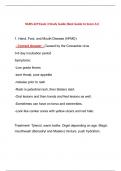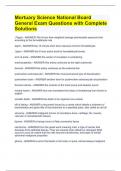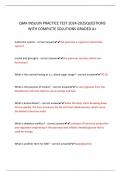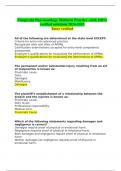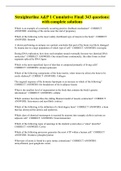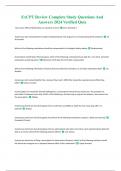International Criminal Tribunals (Procedural Aspects) – Transnational and International Criminal Law
– 2024/2025
Lecture and tutorial notes International Criminal Tribunals – Procedural Aspects
Table of content
WEEK 1 - INTRODUCTION: INTERNATIONAL CRIMINAL PROCEDURE ................................................................ 3
LECTURE NOTES ....................................................................................................................................................... 3
What is international criminal procedure? ..................................................................................................... 3
Overview of international criminal tribunals – focus on procedure ............................................................... 3
Is there a core of International Criminal Procedure? Or should be embrace pluralism? ................................ 4
WEEK 2 – INITIATION OF INVESTIGATIONS AND SELECTION OF CASES ............................................................. 6
LECTURE NOTES ....................................................................................................................................................... 6
Jurisdiction at the ICTs .................................................................................................................................... 6
ICC Material and Temporal Jurisdiction .......................................................................................................... 6
ICC territorial and personal jurisdiction .......................................................................................................... 6
Preconditions for jurisdiction at the ICC ......................................................................................................... 7
Concurrent jurisdiction ................................................................................................................................... 8
Initiation of Investigations .............................................................................................................................. 9
Preliminary Examinations at the ICC .............................................................................................................. 9
Formal investigation and case selection....................................................................................................... 12
Selectivity and controversies ........................................................................................................................ 12
TUTORIAL NOTES ................................................................................................................................................... 13
WEEK 3 – INVESTIGATIONS ............................................................................................................................ 18
LECTURE NOTES ..................................................................................................................................................... 18
Investigations at ICTs.................................................................................................................................... 18
Prosecutorial investigations ......................................................................................................................... 18
On site investigations by the OTP ................................................................................................................. 18
Judicial investigations ................................................................................................................................... 19
Defence investigations ................................................................................................................................. 19
Challenges .................................................................................................................................................... 20
Privatization of investigations ...................................................................................................................... 21
TUTORIAL NOTES ................................................................................................................................................... 22
WEEK 4 – PRE-TRIAL ARREST AND DETENTION ............................................................................................... 26
LECTURE NOTES ..................................................................................................................................................... 26
Preliminary matters ...................................................................................................................................... 26
Right to liberty .............................................................................................................................................. 26
Ad hoc tribunals............................................................................................................................................ 27
At the ICC ...................................................................................................................................................... 28
ICTs and IHRL Standards ............................................................................................................................... 31
TUTORIAL NOTES ................................................................................................................................................... 32
General notes ............................................................................................................................................... 32
Answers to the questions ............................................................................................................................. 32
WEEK 5 – LAW OF EVIDENCE .......................................................................................................................... 38
LECTURE NOTES ..................................................................................................................................................... 38
Evidence in ICL: an overview ......................................................................................................................... 38
1
, Evolution of the law of evidence................................................................................................................... 39
Burden of proof ............................................................................................................................................ 40
Collection of evidence ................................................................................................................................... 40
Disclosure of evidence .................................................................................................................................. 41
Facts requiring proof .................................................................................................................................... 42
Admissibility regime ..................................................................................................................................... 42
Future of evidence in ICL............................................................................................................................... 47
TUTORIAL NOTES ................................................................................................................................................... 49
General notes ............................................................................................................................................... 49
Answers to the questions ............................................................................................................................. 49
WEEK 6 – ROLE AND LEGAL STATUS OF VICTIMS IN INTERNATIONAL CRIMINAL PROCEEDINGS ..................... 54
LECTURE NOTES ..................................................................................................................................................... 54
Victim particpation – an overview ................................................................................................................ 54
Victim-oriented justice.................................................................................................................................. 55
Victim participation in procedural legal traditions and domestic level ........................................................ 56
The evoluation of victims’egal status before the ICCT .................................................................................. 57
Procedural status and rights of victims at the ICC ........................................................................................ 57
The ramification of uncertain victim participation at the ICC ...................................................................... 60
TUTORIAL NOTES ................................................................................................................................................... 62
General notes ............................................................................................................................................... 62
Answers to the questions ............................................................................................................................. 62
2
,Week 1 - Introduction: international criminal procedure
Tip!
Make sure that when you study, you put the Rome Statute next to you so you can read the text of
the Rome Statute.
Lecture notes
Later in the course, there will be a focus on two models, being the (1) ICC and (2) the two ad-hoc
tribunals of ICTR and ICTY which are now merged into the residual mechanism of international criminal
tribunals. International Criminal Procedure can be considered to have two hybrids, as (1) between
international and criminal law, and (2) between common law and civil law.
What is international criminal procedure?
Formally, international criminal procedure contain the rules governing criminal proceedings at
international criminal tribunals and also have as a formal source of law public international law. That
already sets a number of systems apart.
Example to illustrate
The ECCC has in its founding document that the Court shall be ruled by Cambodian Procedure unless
it infringes international criminal procedure. The ICC is based on a treaty and hence their foundation
can be traced back to public international law. The same goes for the ICTY; their foundation can be
traced back to the UN Charter.
Substantively, there are several unique features international criminal procedure
• Important auxiliary goals which are not so much there in national criminal procedure:
o Setting a historical record;
o Truth and reconciliation;
o Restoration of peace and security.
• Heavy, almost full reliance on cooperation from other, national, justice systems – importance
of law on cooperation;
• Very big and complex investigations, charges and trials (mass atrocities) - results in very
lengthy proceedings. This is within the nature of international criminal law, considering mass
atrocities are of huge scale in which the core international crimes function, and hence these
mass atrocities have to be proven;
• Heavy reliance on (eye) witnesses. This is, however, changing considering the reliance upon
digital evidence;
• Importance of external publicity – justice must be seen to be done;
• Participants in proceedings often have different legal backgrounds and cultures;
• No ‘complete justice system’, for example important components are missing, such as
effective legislator, council for the judiciary etc;
• No supervision by international human rights systems: if you look at European countries and
the effects of the ECtHR and see what their effect has been on criminal procedure, that is huge.
Overview of international criminal tribunals – focus on procedure
There are several trends, with one being that we are moving from adversarial to inquisitorial.
Additionally, there is a trend towards ore focus on procedural law as well as it is becoming less political
(it is still very much political however).
3
, The evolution of procedure in international criminal law:
• Post WW II: Nuremberg (IMT) and Tokyo (IMTFE) Tribunals: the tribunals were very punitive.
Rudolf Hess for example fled in 1941 to Scotland where he wanted to see if he could rogue
something like a peace agreement. Still, he was sentenced to life in prison:
o Procedure mainly based on adversarial model: the Brits and Americans had an
important influence within the procedural aspect of the tribunals, hence it was easy
for them to come to a shared plan as they were both adversarial models;
o Very few rules on procedure, simplicity was key: the elements of the adversarial
models of the procedure that could slow down the procedure were not included;
o No international human rights treaties yet: there were notions and rules on fairness in
domestic criminal procedures, but there were no international treaties yet.
• ICTY and ICTR (Yugoslavia and Rwanda): 1993 and 1994:
o Procedure mainly based on adversarial model which is surprising considering there are
not many states that set up a tribunal; we are dealing with the Security Council through
the legal office of the Secretary General. One possible explanation is that there were
some strong Americans in the legal office that were of key importance to the drafting
of the Statute of the tribunals:
▪ Another possible explanation is that the rules on evidence and procedure was
made by the input of various states, but the American Bar Association
submitted a lot of benchmark rules that were copied.
o Judge made law, with elements of inquisitorial law, especially admission of evidence
(art. 14/ 15 Statute). The judges came from different States resulting in a different
inputs in procedural elements;
o No victims participation yet;
• ICC: 1998, entry into force 1 July 2002: here, the situation is different considering we are
dealing with something permanent:
o Procedure contains more inquisitorial elements, such as confirmation of charges, PTC,
role for victims;
o Procedural rules determined by states parties – little flexibility;
o Difficulties with cooperation and enforcement of cooperation.
• Internationalised courts: examples of such are those of sierra Leone - SCSL (T), East Timor -
SPSC (T), Cambodia - ECCC (T), Lebanon - STL (T), Bosnia - WCC (T), Kosovo - KSC (O), CAR -
SCC(O):
o These internationalised courts have opted for one of these two models:
▪ Some have said that there is now an ICC Statute, and portions of those have
been copied (East Timor);
▪ The majority has looked at the ICTY also because of the simplicity and the
proven effectiveness although with important changes such as the inclusion
of victim participation.
o The internationalised courts are interesting as experiments but for the effect they
have had on the body of international criminal law procedure is very limited, resulting
in us to not really focus on them as much.
Is there a core of International Criminal Procedure? Or should be embrace pluralism?
This question has been touched upon in the research project ‘Rules and Principles of ICP’. This has
resulted in an almost 2000 page book. For different faces of the criminal procedure and different
thematic aspects, stocktaking has been conducted: what rules are shared by international criminal
tribunals? Then they have evaluated these rules and asked whether these rules comply with important
values, such as human rights law, and goals of ICP. Fortunately, many of them did. Some of them such
as relating to the rules on liberty (detention) shortcomings had been identified. If it survived the
evaluation, rules and principles of ICP have been established. These are commonly shared rules that
4



